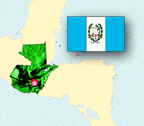Because Guatemala is relatively close to North America, it is one of
the easier Latin American countries to hear. Unless you are in a very
noisy location, Guatemala should be received even on mid-priced portables
with just the attached whip (rod) antenna. Of course, better equipment would
be necessary for stronger and more consistent reception. Generally speaking,
Guatemala's shortwave stations come on each morning between 1000 to 1100 UTC
(0400 to 0500 am Guatemalan time) and can be heard until the fade out with
local dawn. In the evening they can be heard from around sunset, more or less,
until sign-off, usually around 0400 UTC (10 p.m. Guatemalan time).
By law, there is no commercial shortwave broadcasting in Guatemala. For this
reason, all of Guatemala's shortwave stations are relgious - Roman Catholic,
Protestant Evangelical, or Seventh Day Adventist. Most of the stations are
located in the interior of the country and primarily serve various groups of
Mayan Indians, with programming in both Spanish and local languages. Of
course, the stations play a lot of marimba and other types of typical
Guatemalan music, which anyone can enjoy!
Probably the best heard Guatemalan is Radio Tezulutlan from Coban on 4835 and
3370 kHz. Broadcasts are in Spanish and Kekchi. Other strong stations in the
sixty meter band are Radio Buenas Nuevas from San Sebastian Huehuetenango
broadcasts in Mam on 4800 kHz, Radio Cultural Coatan on 4780 kHz from San
Sebastian Coatan, and Radio Kekchi on 4845 from Fray Bartolome Casas. Radio
Tezulutlan is Roman Catholic, while the other three are Evangelical. A final
station on 60 meters is Roman Catholic Radio Mam on 4825 from Cabrican.
Unfortunately, they only broadcast during local daylight hours so can not be
heard at a distance unless they stay on late for a special event.
The strongest Guatemalan on 90 meters is Evangelical station Radio Cultural,
TGNA, on 3300 kHz from Guatemala City. Programming on this one is primarily in
Spanish, but there is some precorded English in the late hours as well. Radio
Maya de Barillas, on 3325 kHz from Barillas, is another Evangelical station.
Radio Chortis on 3360 from Jocatan and La Voz de Nahuala on 3360 from Nahuala
are the two Roman Catholic stations on 90 meters (along with Radio
Tezulutlan's 3370 kHz frequency). All the stations on 60 and 90 meters are
generally easy to hear.
Without good quality equipment, it is difficult to log any stations on the 120
meter band. However, for the record, La Voz de Atitlan from Santiago Atitlan
uses 2390 kHz. The frequency is shared by Radio Huayacocotla in Mexico,
however, so one can not always be sure which station is being received. Radio
Maya de Barillas has a second frequency of 2360 kHz, which is a very difficult
log.
Finally, the Seventh Day Adventist church opertes Union Radio on 5980 kHz.
This is very low-powered and suffers from interference from the many
international broadcasters in 49 meters, so it is very difficult to hear.
This website is maintained by Don Moore,
Guatemala Menu
Main Menu
What's New
Best of this Site
Radio History
Clandestine Radio
Hearing Guatemala on Shortwave
By Don Moore

 All Guatemalan shortwave stations operate on the "tropical bands", as
the lower shortwave frequencies are called. Because good long-distance
reception on lower frequencies requires a darkness path, obviously these
stations will be best heard during the North American winter months and least
well heard during the North American summer. Likewise, the stations can be
heard earlier in the evening and later in the morning during the winter months
when there is more darkness.
All Guatemalan shortwave stations operate on the "tropical bands", as
the lower shortwave frequencies are called. Because good long-distance
reception on lower frequencies requires a darkness path, obviously these
stations will be best heard during the North American winter months and least
well heard during the North American summer. Likewise, the stations can be
heard earlier in the evening and later in the morning during the winter months
when there is more darkness.
Association of North American Radio Clubs
DXer of the Year for 1995.